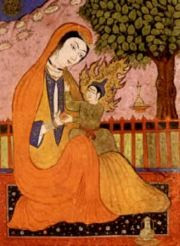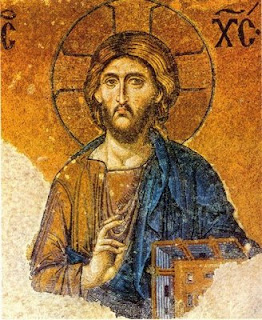Apocryphote of the Day: 8-12-09
/Ahmad ibn Hanbal, al-Zuhd, The Muslim Jesus, p. 98.
 Jesus said, "A person can bring forth only what is within him."
Jesus said, "A person can bring forth only what is within him." Jesus said, "Truly I say to you, God will not leave one stone of this mosque upon another but will destroy it utterly because of the sins of its people. God does nothing with gold, silver, or these stones. More dear to God than all these are the pure in heart. Through them, God builds up the earth, or else destroys it if these hearts are other than pure."
Jesus said, "Truly I say to you, God will not leave one stone of this mosque upon another but will destroy it utterly because of the sins of its people. God does nothing with gold, silver, or these stones. More dear to God than all these are the pure in heart. Through them, God builds up the earth, or else destroys it if these hearts are other than pure."Isla Carroll and Percy E. Turner Professor of New Testament and Early Christianity since 2006
Chair of the Department of Religion at Rice University 2013-2019
Figure Foundation Book Award for The Gnostic New Age: How a Countercultural Spirituality Revolutionized Religion From Antiquity to Today (New York: Columbia University Press 2016)
Grant Recipient with James McGrath and Charles Häberl, National Endowment for the Humanities, The Mandaean Book of John: Critical Edition, Translation, and Commentary, 2012-14
Co-Founder and Executive Editor of GNOSIS: Journal of Gnostic Studies (Leiden: Brill) since 2015
Editorial Board of Journal of the American Academy of Religion (Oxford: Oxford University Press) since 2019
Editorial Board for Nag Hammadi and Manichaean Studies (Leiden: Brill) since 2008
Grant recipient and Faculty Leader of Andrew W. Mellon Graduate Research Seminar, Emerging Religions 2017-2019
Chair, Society of Biblical Literature, Committee for the Status of Women in the Profession, 2016-2018
Research Fellow in the Boniuk Institute for the Study and Advancement of Religious 2014-2015
Associate Editor for Macmillan Interdisciplinary Handbooks on Religion, ten-volumes, 2016
Faculty in the Center for the Study of Women, Gender and Sexuality, Rice University, since 2006
Grant recipient and Faculty Leader of Andrew W. Mellon Graduate Research Seminar, Mapping Death, 2010-2012
Associate Editor for Vigiliae Christianae, Journal and Monograph series (Leiden: Brill) 2014-2015
Co-chair of Nag Hammadi and Gnosticism Section, Society of Biblical Literature, 2012-2018
Founding Chair and Member of Steering Committee of Mysticism, Esotericism and Gnosticism in Antiquity Section, Society of Biblical Literature since 1996
Member of Committee on the Status of Women in the Profession, Society of Biblical Literature, 2012-2018
Founder of the Cognition and Culture in the Humanities Workshop, Rice University, 2011-2013
29th Annual Loy Witherspoon Lecturer, University of North Carolina 2013
Centennial Lecturer for Rackham School of Graduate Studies, University of Michigan 2012
Edgar and Dorothy Davidson Annual Lecturer, Carleton University 2009
Member of Phi Kappa Phi Honors Society since 2002
Member of Phi Beta Kappa Honors Society since 1988
Affiliated with the Society of Biblical Literature since 1987
Affiliated with the International Association for Coptic Studies since 2006
Affiliated with the North American Patristics Society since 2006
Affiliated with the American Academy of Religion since 2007
Affiliated with the European Society for the Study of Western Esotericism since 2016
C
Powered by Squarespace